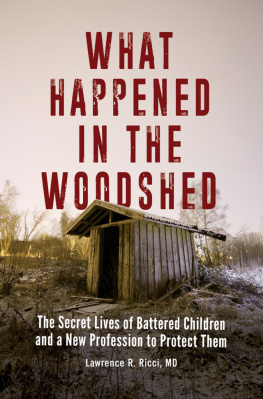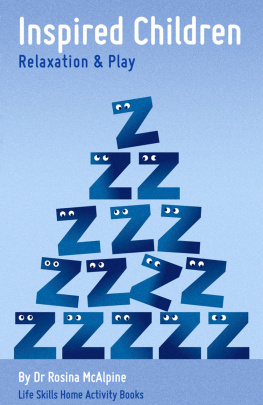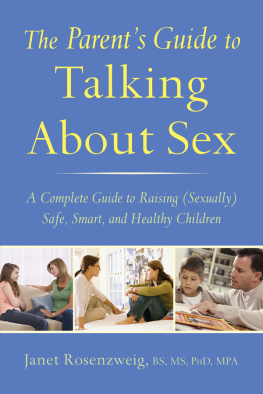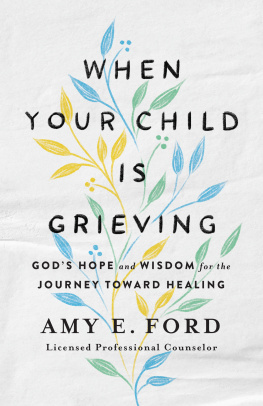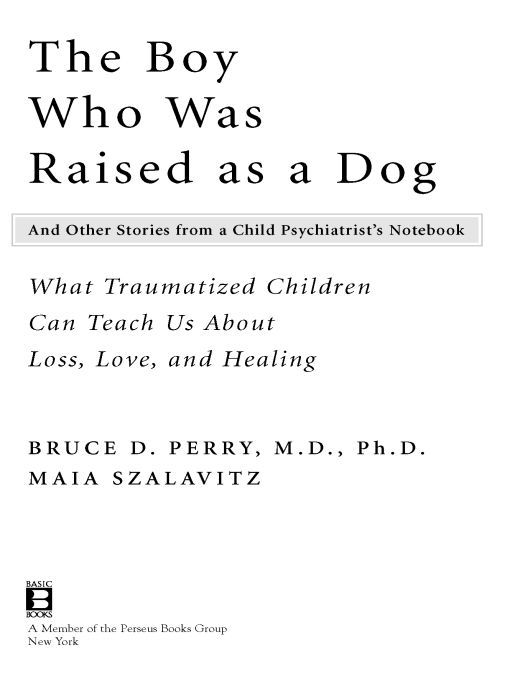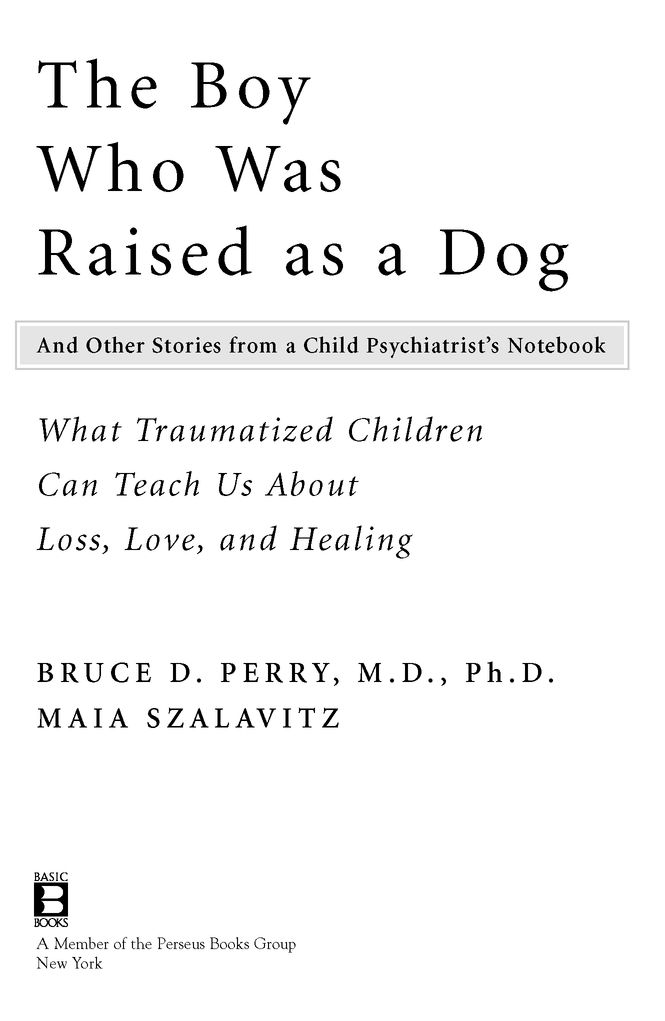Table of Contents
Praise for The Boy Who Was Raised as a Dog
I have never encountered a child advocate with a better mind, a bigger heart, or a more generous spirit than Bruce Perry. This book captures the essence of his insights and the heroism of his actions on behalf of children who have encountered the dark side of human experience.
JAMES GARBARINO, PH.D., author of Lost Boys: Why Our Sons Turn Violent and How We Can Save Them
The Boy Who Was Raised as a Dog is Bruce Perrys finest achievement.... It gives us the opportunity to unlock the deepest mystery of our species: why some children turn out to be heroes and others to be predatory sociopaths. Anyone who wants to understand childhood trauma and its heartbreaking consequences must read this book.
ANDREW VACHSS, best-selling author of Mask Market and founder and national advisory board member of PROTECT: The National Association to Protect Children
Filled with compassionate, caring stories by a wise healer and scientist, this book will appeal to all who are interested in understanding how children heal.
LYNN PONTON, M.D., author of The Romance of Risk
I have admired and respected Bruce Perry for over a decade. His commitment to helping young children raised in chaotic and abusive environments is nothing short of remarkable. This book is an important tool in helping us understand the critical impact of early experiences in childrens lives, and it shows us how to help those who have been damaged by neglect. Anyone who deals with vulnerable or troubled youthfrom social workers to judges, daycare workers to high school teachers, parents to politicianscan gain important perspectives from this book.ROB REINER
In this harrowing but profoundly humane book, Perry and Szalavitz provide an all too timely, utterly engrossing account of traumatized childrens lives.... Once I opened it, I could not put it down.
SARAH BLAFFER HRDY, author of Mother Nature: Maternal Instincts and How They Shape the Human Species
For many years, Bruce Perrys work has been deserving of our highest praise. This book is his crowning achievement, the ultimate combination of science and humanity.
JOEL A. DVOSKIN, PH.D., ABPP, University of Arizona College of Medicine, and President, American Psychology-Law Society
Bruce D. Perry:
For my Clan
Barbara, Jay, Emily, Maddie, Elizabeth,
Katie, Martha, Robbie
In memory of Arlis Dykema Perry (1955-1974)
Maia Szalavitz:
For my mother, Nora Staffanell
Authors Note
The stories in this book are all true, but in order to ensure anonymity and protect privacy, we have altered identifying details. The childrens names have been changed, as have the names of their adult family members if that information would identify the child. All other adult names are real names, except those identified with an asterisk. Despite these necessary changes, the essential elements of each case are reported as accurately as possible. Conversations, for example, are depicted as recalled and/or as recorded in notes, audio tapes or video.
The sad reality is that these stories are but a tiny percentage of the many we could have told. Over the last ten years our clinical group at the ChildTrauma Academy has treated more than a hundred children who have witnessed the murder of a parent. We have worked with hundreds of children who endured severe early neglect in institutions or at the hands of their parents or guardians. We hope that the strength and spirit of the children whose stories we tell in this book, and the many others who have suffered similar fates, come through on these pages.
Introduction
ITS HARD TO IMAGINE today, but when I was in medical school in the early 1980s researchers didnt pay much attention to the lasting damage that psychological trauma can produce. Even less consideration was given to how trauma might harm children. It wasnt considered relevant. Children were believed to be naturally resilient, with an innate ability to bounce back.
When I became a child psychiatrist and neuroscientist, it was not my goal to refute this misguided theory. But then, as a young researcher, I began to observe in the lab that stressful experienceparticularly in early lifecould change the brains of young animals. Numerous animal studies showed that even seemingly minor stress during infancy could have a permanent impact on the architecture and the chemistry of the brain and, therefore, on behavior. I thought: why wouldnt the same be true for humans?
That question became even more salient to me as I began my clinical work with troubled children. I soon found that the vast majority of my patients had lives filled with chaos, neglect and/or violence. Clearly, these children werent bouncing backotherwise they wouldnt have been taken to a child psychiatry clinic! Theyd suffered traumasuch as being raped or witnessing murderthat would have had most psychiatrists considering the diagnosis of post-traumatic stress disorder (PTSD), had they been adults with psychiatric problems. And yet these children were being treated as though their histories of trauma were irrelevant, and theyd coincidentally developed symptoms, such as depression or attention problems, that often required medication.
Of course, the diagnosis of PTSD was only itself introduced into psychiatry in 1980. At first, it was seen as something rare, a condition that only affected a minority of soldiers who had been devastated by combat experiences. But soon the same kinds of symptomsintrusive thoughts about the traumatic event, flashbacks, disrupted sleep, a sense of unreality, a heightened startle response, extreme anxietybegan to be described in rape survivors, victims of natural disaster and people whod had or witnessed life-threatening accidents or injuries. Now the condition is believed to affect at least 7 percent of all Americans and most people are familiar with the idea that trauma can have profound and lasting effects. From the horrors of the 9/11 terrorist attacks to the aftermath of Hurricane Katrina, we recognize that catastrophic events can leave indelible marks on the mind. We know nowas my research and that of so many others has ultimately shownthat the impact is actually far greater on children than it is on adults.
I have made it my lifes work to understand how trauma affects children and to develop innovative ways to help them cope with it. I have treated and studied children faced with some of the most horrendous experiences imaginablefrom the surviving victims of the Branch Davidian cult conflagration in Waco, Texas, to neglected Eastern European orphans, to genocide survivors. I have also helped courts sort through the wreckage of misguided Satanic Ritual Abuse prosecutions based on coerced accusations from tortured, terrified children. I have done my best to help children who witnessed their parents murders, and those whove spent years chained in cages or locked in closets.
While most children will never suffer anything as awful as what many of my patients have undergone, it is the rare child who escapes trauma entirely. By conservative estimates, about 40 percent of American children will have at least one potentially traumatizing experience by age eighteen: this includes the death of a parent or sibling, ongoing physical abuse and/or neglect, sexual abuse, or the experience of a serious accident, natural disaster or domestic violence or other violent crime.


